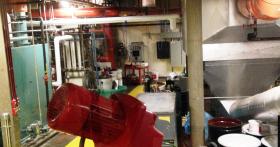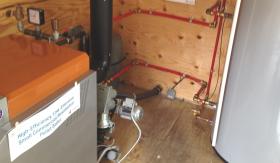Michael Kelleher, Executive Director of Energy and Sustainability at the college, says their bioenergy heating and power system is so efficient that its emissions may be less than those from a far smaller, more traditional source.
“She believes the fine particulate emissions from our fryer are actually greater than what we’ll have from something that heats two-thirds of the campus. So we’re going to do that testing as we get forward,” Kelleher said Wednesday, during a tour of the school’s combined heating and power facility.
Bioenergy systems such as the one at SUNY ESF appear to be serving larger institutions well, however there are still some barriers to their broader residential use. Patrick Vincent, owner of Vincent’s Heating and Fuel Service, is a proponent of bioenergy; but he says installation costs are still too high for some.
“Biomass is a really tough thing… so you’re looking at, probably, anywhere from $18,000-$20,000 on average installation. That gives them everything they want though.” Vincent said during a demonstration of one of his company’s wood-pellet heating systems.
There is a program in place to help overcome the initial cost and make the technology more accessible. Mark Watson, Program Manager for NYSERDA, says the governor’sRenewable Heat NY program is up and running.
“The state has made a commitment of $27 million to support the growth of New York-based wood-fired boiler technology and manufacturing, wood pellet manufacturing and delivery, and sustainably harvested wood fuels from New York State forests.”Watson said, during a conference where several people spoke on the state of New York’s bioenergy industry.
Watson says the program is looking to help the bioenergy industry become sustainable and also create jobs. In New York State, some residents have been shown to spend up to 30% of their income on heating their home, which is a figure Watson says they hope to reduce.
Read the story at Syracuse Public Media WAER 88.3.







